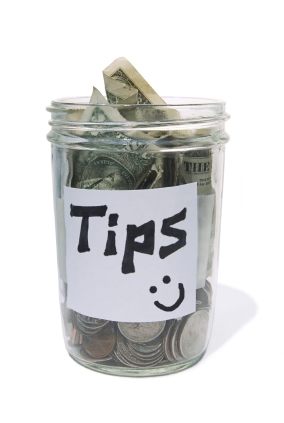It's not a tip when its not your money!
 A few weeks ago while on the honeymoon, I noticed a person next to me in the hotel's internet business center do something strange as he fnished his Internet session. (Umm...yes I'm strange that way and sometime don't realise that its that rude to notice other people's surfing habits. :) )
A few weeks ago while on the honeymoon, I noticed a person next to me in the hotel's internet business center do something strange as he fnished his Internet session. (Umm...yes I'm strange that way and sometime don't realise that its that rude to notice other people's surfing habits. :) )As he got up to leave, he clicked on an ad on the page he was reading. Just as the ad started to load, he quickly switched back to the original page, clicked on another ad and then quickly logged out of his Internet session. He left the room without returning his chair under the desk, and with me shaking my head.
Why you ask? And what was he doing?
It reminded me of this head-shaker of a blog post(Ads are the new online tip jar) (that I read on Seth Godin's blog many months ago. Text below:
"If you like what you're reading, click an ad to say thanks.
Pretty simple, but not an accepted online protocol, at least not yet.
If every time you read a blog post or bit of online content you enjoyed you clicked on an ad to say thanks, the economics of the web would change immediately. You don't have to buy anything (though it's fine if you do). You just have to honor the writer by giving them a click.
You still get what you pay for, even if you pay with attention."
No Seth. Its not like leaving a tip. A tip is when you take money out of your pocket because you want to (or because society expects you to:)) When you take the money out of someone else's pocket, no matter how Robin-Hoody that makes you feel, its still wrong.
But let's leave aside that aspect of it for a bit. This isn't a moral issue, its a business system issue. In the long run, you're also hurting the economics of the system that makes Internet advertising work and very possibly the same site that you're actually trying to help. Let me try to explain, so that at least people whom I know don't do this.
Internet advertising is generally bought either CPC (i.e. per the advertiser pays the site for the number of clicks back to its own site) or CPM (i.e. the advertiser pays the site for the number of people that see the ad.)
Internet advertising is generally bought either CPC (i.e. per the advertiser pays the site for the number of clicks back to its own site) or CPM (i.e. the advertiser pays the site for the number of people that see the ad.)
So how does clicking when you don't really find the ad interesting mess things up?
- If the advertiser is paying the site that you're visiting (the publisher) CPM, it doesn't. The publisher gets paid because you showed up on the site and hopefully glanced at the ad. The world moves on, and everyone is happy. If you clicked on the ad thinking you were doing some good, you just wasted some bandwidth.
- If the advertiser is paying the site CPC, things get interesting. The publisher only gets paid by the advetiser if you click on the link. If you genuinely think the link might be interesting to you and you click on it, this is a good thing. The advertiser knows through experience that some percentage of people that click through to the advertiser's site will end up buying a product/service etc. The advertiser has used this and other data, to calculate a minimum price that he/she is willing to pay per-click.
Now, by clicking willy-nilly on ads on your favorite sites' pages, in the short-run and assuming that you're the only one in the world who does this once in a while, you are adding a little more money into the site's pocket. In the longer-run however, the advertiser has the data to see that they are getting fewer useful clickthroughs from that site.
They'll resort to measures such as reducing how much they are willing to pay for a click-through from the site, or even worse decide they don't want to waste their dollars on that site anymore. Oh and its gets worse. Ad Networks such as Google's Adsense may decide to penalize the publisher site that's leading to these inefficient clicks, most likely algorithmically.
So, the moral of the story? Like your mother undoubtedly told you
- Nothing in life is free.
- Be yourself (i.e. don't alter your internet surfing behavior)
The advantage of the Internet economy is that data is quickly available and people use it, meaning that inefficiencies are often quickly factored in and eliminated. So, just act in your self-interest, don't waste time and bandwidth clicking on things you don't want to, and let the market figure things out. Caveat emptor: that's my educational bias squeaking through again. :)

Comments
I would be remiss if I didn't ask you why if you were on your "honeymoon" you were out in the internet cafe looking at your cp? lol Did I read that right?
:) The internet check was just 15 mins; I needed an email fix and had the wife's permission.:)